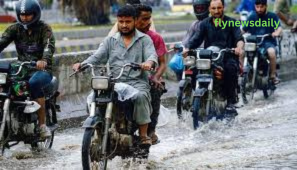
In a significant move aimed at tightening security and maintaining law and order, the Sindh Government has announced a complete ban on pillion riding in Karachi and other major cities of the province. This decision comes as a response to rising concerns about public safety and security in light of recent incidents. As the government enforces this restriction, residents and daily commuters are left grappling with the implications of the ban. Here, we delve into the reasons behind this controversial decision, the impact on the public, and what lies ahead.
Why the Ban on Pillion Riding?
The pillion riding ban isn’t new to the residents of Sindh, especially those in Karachi. However, the recent implementation has raised questions regarding its timing and necessity. Historically, the Sindh Government has imposed similar bans during times of heightened security threats, religious observances, or significant public events. This time, the ban is driven by the growing number of incidents involving street crimes, targeted attacks, and security threats posed by individuals using motorcycles to evade law enforcement.
Authorities have noted a troubling rise in criminal activities conducted by motorcyclists, particularly those with a pillion rider. Street crimes, including mobile snatching, theft, and targeted killings, have surged in recent months, prompting a strong response from the government. Law enforcement agencies believe that restricting pillion riding can significantly curb these crimes by limiting the mobility of potential offenders.
Official Statement from Sindh Government
The Sindh Home Department issued an official notification, stating that the pillion riding ban is a preventive measure to control the law and order situation. The notification reads:
“In the interest of public safety and to maintain law and order, pillion riding is prohibited with immediate effect in Karachi, Hyderabad, Sukkur, and other major cities across the province. This ban will be enforced until further notice. Exceptions will be made for women, children under the age of 12, the elderly, and journalists with valid identification.”
The government has urged citizens to comply with this directive to ensure public safety, emphasizing that violations will be strictly dealt with under the law.
Impact on Daily Commuters and Public Reaction
The ban on pillion riding has stirred a wave of reactions among the public. For many in Karachi and other urban centers, motorcycles are a primary mode of transport, especially for lower and middle-income families. The restriction is seen as a significant inconvenience, disrupting daily routines, work commutes, and family travel.
Commuters have expressed frustration, arguing that the ban punishes law-abiding citizens while criminals may still find ways to circumvent the law. Social media platforms are abuzz with residents voicing their concerns and seeking alternative solutions that address security issues without disrupting daily life.
Economic Impact and Alternatives
The economic implications of the ban are also noteworthy. Motorcycle taxis, widely used by students, office workers, and low-wage earners, will be particularly affected. Many riders rely on pillion passengers for their livelihood, and the ban directly impacts their daily earnings. For families with no alternative means of transport, this restriction adds a financial burden as they are forced to seek more expensive travel options such as rickshaws, taxis, or public buses.
To mitigate the impact, authorities have suggested the use of public transport; however, the lack of a reliable and efficient public transport system in cities like Karachi only amplifies the problem. There is a pressing need for the government to explore other measures, such as increasing police patrols, installing more CCTV cameras, and enhancing community policing, which could address security concerns without causing widespread inconvenience.
Security Measures and Law Enforcement
The ban on pillion riding forms part of a broader strategy by law enforcement agencies to tighten security across Sindh. The police force has been instructed to increase roadblocks, conduct random checks, and enhance surveillance in high-risk areas. Mobile units and motorcycle squads have been deployed to monitor compliance and swiftly respond to any incidents.
Strict penalties await violators, including fines, motorcycle impoundment, and possible legal action. Law enforcement agencies have also been directed to conduct awareness campaigns, urging citizens to cooperate and understand the reasons behind the ban. The Sindh Police has reassured the public that the measure is temporary and will be lifted once the security situation stabilizes.
Exceptions to the Ban
In acknowledgment of the challenges posed by the pillion riding ban, the government has outlined specific exceptions:
- Women, elderly citizens, and children under 12 are exempt from the ban.
- Journalists and media personnel carrying valid press cards are allowed to travel with pillion riders.
- Essential service providers, including medical professionals and law enforcement officials, may also be exempted in certain circumstances.
These exceptions aim to reduce the impact on vulnerable groups while maintaining a focus on security.
Public Safety vs. Public Inconvenience: Striking a Balance
The imposition of the pillion riding ban raises critical questions about the balance between public safety and public inconvenience. While the government’s commitment to security is commendable, the recurring implementation of such bans without addressing the root causes of crime indicates a reactive rather than proactive approach.
Many experts argue that the focus should be on strengthening the capacity of law enforcement agencies, investing in modern technology, and addressing socio-economic factors that drive crime. A comprehensive strategy that includes community engagement, improved street lighting, and enhanced police-citizen communication could offer more sustainable solutions.
What’s Next?
As the ban on pillion riding continues, the Sindh Government faces the challenge of managing public discontent while ensuring that security objectives are met. Citizens are hopeful that the ban will be lifted soon and that more effective, long-term solutions will be introduced to address the rising crime rates in the province.
In the meantime, residents are urged to stay informed, adhere to the regulations, and cooperate with law enforcement to help maintain peace and security across Sindh.



